Foreign Bribery and Domestic Corruption: Comparative Law and Solutions
VerifiedAdded on 2023/01/05
|11
|2824
|40
Report
AI Summary
This report delves into the critical issues of foreign bribery and domestic corruption, exploring their detrimental impacts on economies and governance, particularly in the context of Azerbaijan. The report examines the necessity for robust legal frameworks to combat these issues, advocating for the implementation of stringent legislation. It provides a comparative analysis of key anti-corruption laws, including the Foreign Corrupt Practices Act (FCPA) of the United States, the Bribery Act 2010 of the United Kingdom, and the OECD Anti-Bribery Convention. The report outlines the core principles, provisions, and enforcement mechanisms of these laws, offering insights into their effectiveness and potential application in Azerbaijan. Furthermore, it highlights the four pillars of Brazil's new anti-corruption regime as a potential model for legislative reform. By analyzing these international frameworks, the report aims to provide actionable recommendations for Azerbaijan to strengthen its anti-corruption efforts and foster a more transparent and accountable environment.
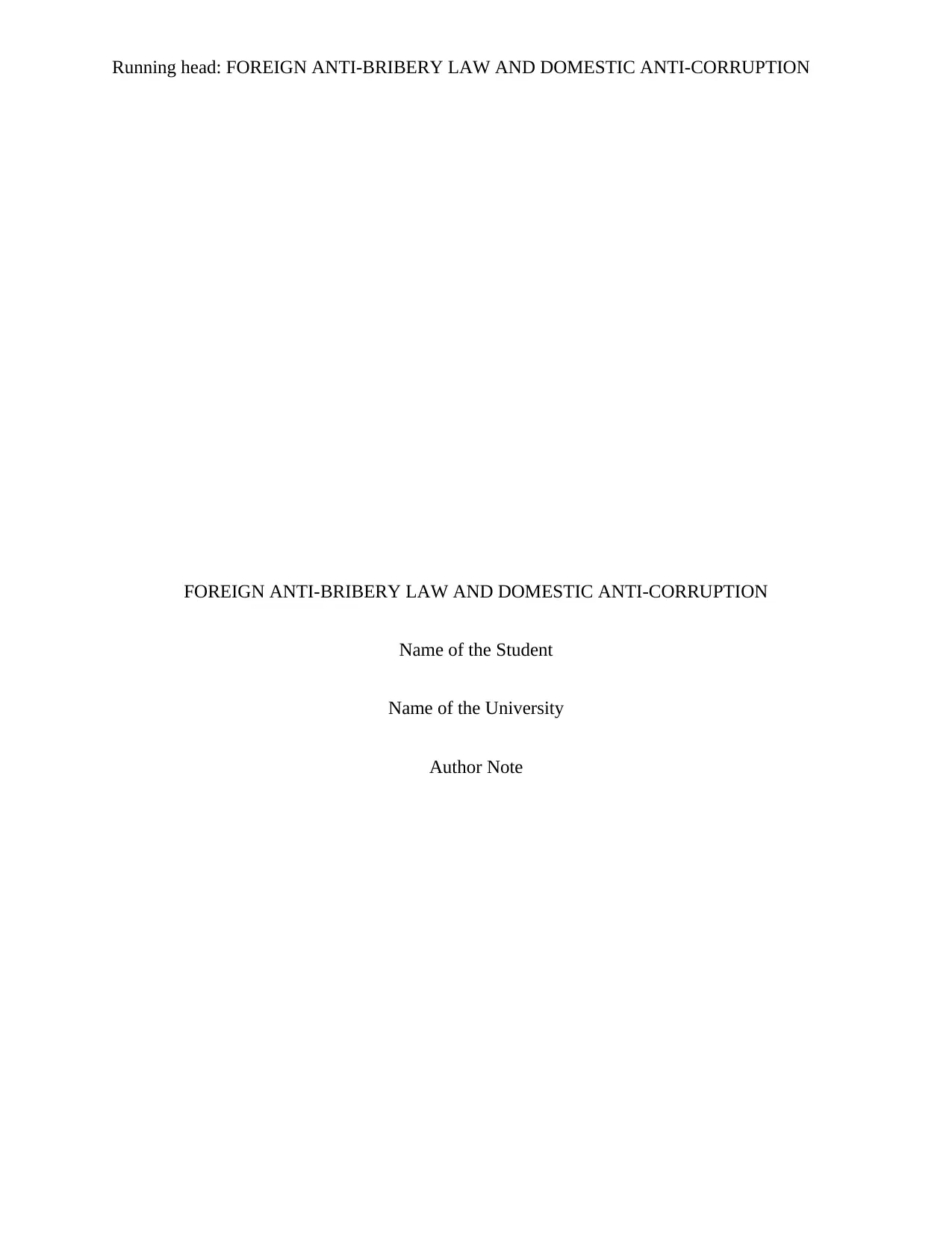
Running head: FOREIGN ANTI-BRIBERY LAW AND DOMESTIC ANTI-CORRUPTION
FOREIGN ANTI-BRIBERY LAW AND DOMESTIC ANTI-CORRUPTION
Name of the Student
Name of the University
Author Note
FOREIGN ANTI-BRIBERY LAW AND DOMESTIC ANTI-CORRUPTION
Name of the Student
Name of the University
Author Note
Paraphrase This Document
Need a fresh take? Get an instant paraphrase of this document with our AI Paraphraser
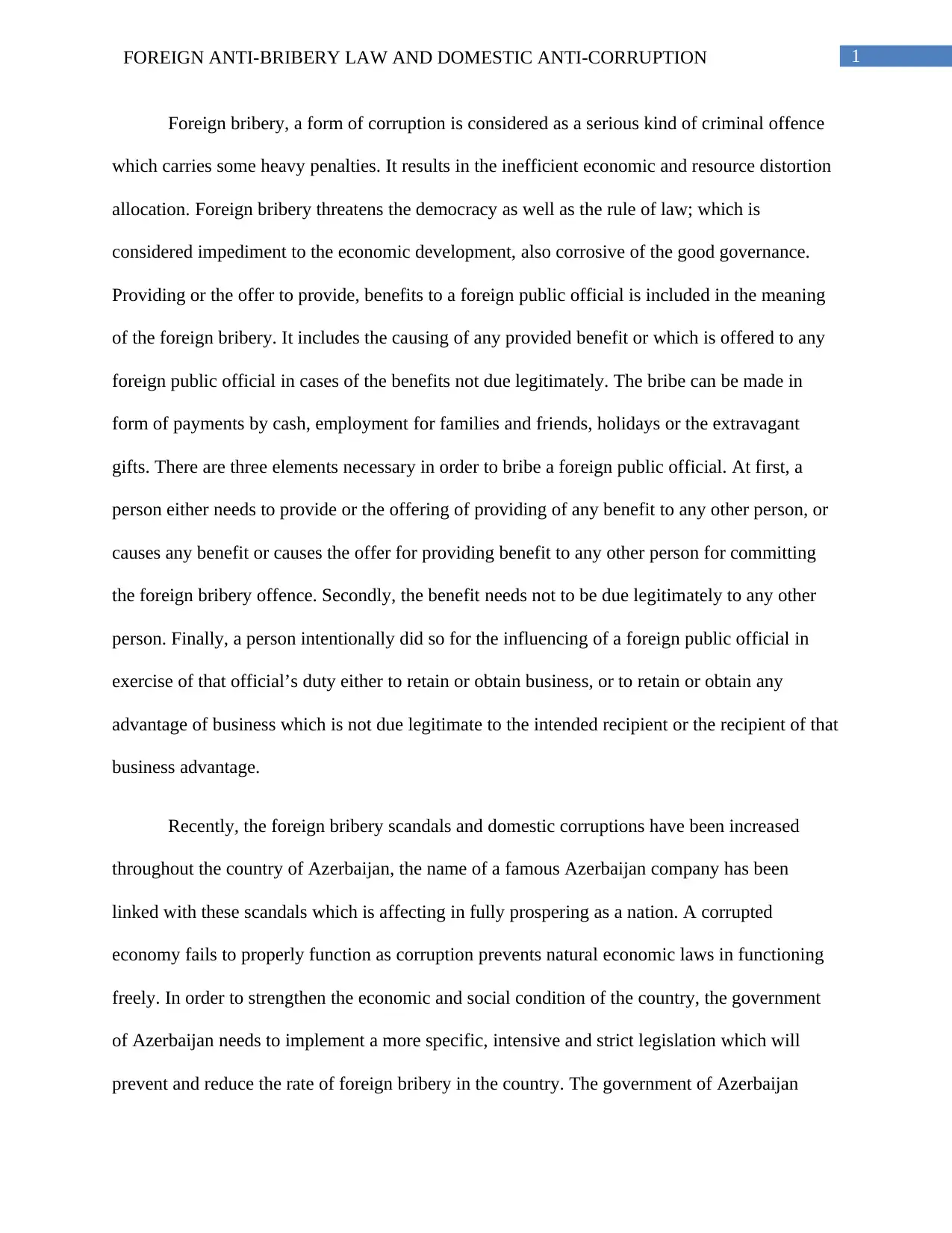
1FOREIGN ANTI-BRIBERY LAW AND DOMESTIC ANTI-CORRUPTION
Foreign bribery, a form of corruption is considered as a serious kind of criminal offence
which carries some heavy penalties. It results in the inefficient economic and resource distortion
allocation. Foreign bribery threatens the democracy as well as the rule of law; which is
considered impediment to the economic development, also corrosive of the good governance.
Providing or the offer to provide, benefits to a foreign public official is included in the meaning
of the foreign bribery. It includes the causing of any provided benefit or which is offered to any
foreign public official in cases of the benefits not due legitimately. The bribe can be made in
form of payments by cash, employment for families and friends, holidays or the extravagant
gifts. There are three elements necessary in order to bribe a foreign public official. At first, a
person either needs to provide or the offering of providing of any benefit to any other person, or
causes any benefit or causes the offer for providing benefit to any other person for committing
the foreign bribery offence. Secondly, the benefit needs not to be due legitimately to any other
person. Finally, a person intentionally did so for the influencing of a foreign public official in
exercise of that official’s duty either to retain or obtain business, or to retain or obtain any
advantage of business which is not due legitimate to the intended recipient or the recipient of that
business advantage.
Recently, the foreign bribery scandals and domestic corruptions have been increased
throughout the country of Azerbaijan, the name of a famous Azerbaijan company has been
linked with these scandals which is affecting in fully prospering as a nation. A corrupted
economy fails to properly function as corruption prevents natural economic laws in functioning
freely. In order to strengthen the economic and social condition of the country, the government
of Azerbaijan needs to implement a more specific, intensive and strict legislation which will
prevent and reduce the rate of foreign bribery in the country. The government of Azerbaijan
Foreign bribery, a form of corruption is considered as a serious kind of criminal offence
which carries some heavy penalties. It results in the inefficient economic and resource distortion
allocation. Foreign bribery threatens the democracy as well as the rule of law; which is
considered impediment to the economic development, also corrosive of the good governance.
Providing or the offer to provide, benefits to a foreign public official is included in the meaning
of the foreign bribery. It includes the causing of any provided benefit or which is offered to any
foreign public official in cases of the benefits not due legitimately. The bribe can be made in
form of payments by cash, employment for families and friends, holidays or the extravagant
gifts. There are three elements necessary in order to bribe a foreign public official. At first, a
person either needs to provide or the offering of providing of any benefit to any other person, or
causes any benefit or causes the offer for providing benefit to any other person for committing
the foreign bribery offence. Secondly, the benefit needs not to be due legitimately to any other
person. Finally, a person intentionally did so for the influencing of a foreign public official in
exercise of that official’s duty either to retain or obtain business, or to retain or obtain any
advantage of business which is not due legitimate to the intended recipient or the recipient of that
business advantage.
Recently, the foreign bribery scandals and domestic corruptions have been increased
throughout the country of Azerbaijan, the name of a famous Azerbaijan company has been
linked with these scandals which is affecting in fully prospering as a nation. A corrupted
economy fails to properly function as corruption prevents natural economic laws in functioning
freely. In order to strengthen the economic and social condition of the country, the government
of Azerbaijan needs to implement a more specific, intensive and strict legislation which will
prevent and reduce the rate of foreign bribery in the country. The government of Azerbaijan
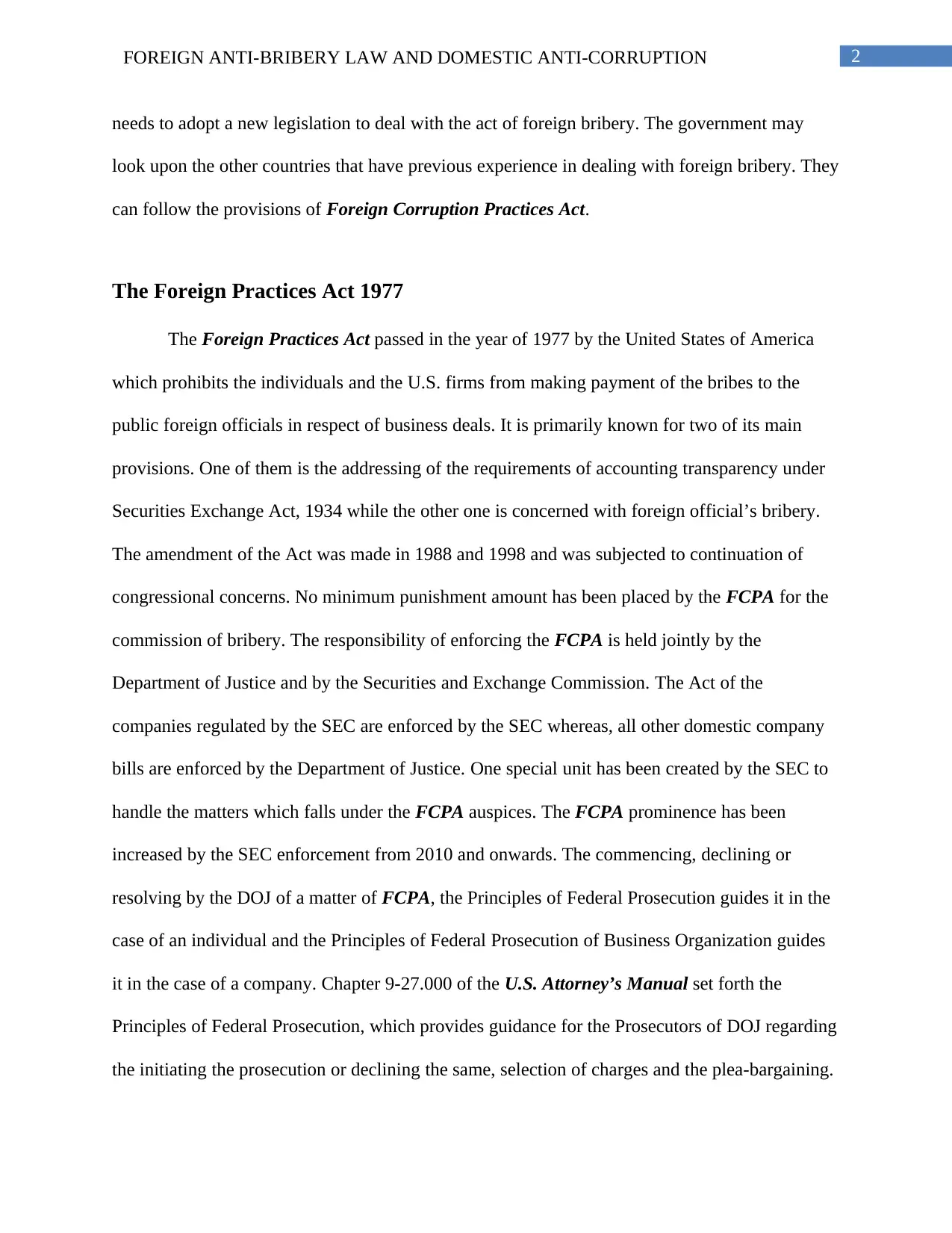
2FOREIGN ANTI-BRIBERY LAW AND DOMESTIC ANTI-CORRUPTION
needs to adopt a new legislation to deal with the act of foreign bribery. The government may
look upon the other countries that have previous experience in dealing with foreign bribery. They
can follow the provisions of Foreign Corruption Practices Act.
The Foreign Practices Act 1977
The Foreign Practices Act passed in the year of 1977 by the United States of America
which prohibits the individuals and the U.S. firms from making payment of the bribes to the
public foreign officials in respect of business deals. It is primarily known for two of its main
provisions. One of them is the addressing of the requirements of accounting transparency under
Securities Exchange Act, 1934 while the other one is concerned with foreign official’s bribery.
The amendment of the Act was made in 1988 and 1998 and was subjected to continuation of
congressional concerns. No minimum punishment amount has been placed by the FCPA for the
commission of bribery. The responsibility of enforcing the FCPA is held jointly by the
Department of Justice and by the Securities and Exchange Commission. The Act of the
companies regulated by the SEC are enforced by the SEC whereas, all other domestic company
bills are enforced by the Department of Justice. One special unit has been created by the SEC to
handle the matters which falls under the FCPA auspices. The FCPA prominence has been
increased by the SEC enforcement from 2010 and onwards. The commencing, declining or
resolving by the DOJ of a matter of FCPA, the Principles of Federal Prosecution guides it in the
case of an individual and the Principles of Federal Prosecution of Business Organization guides
it in the case of a company. Chapter 9-27.000 of the U.S. Attorney’s Manual set forth the
Principles of Federal Prosecution, which provides guidance for the Prosecutors of DOJ regarding
the initiating the prosecution or declining the same, selection of charges and the plea-bargaining.
needs to adopt a new legislation to deal with the act of foreign bribery. The government may
look upon the other countries that have previous experience in dealing with foreign bribery. They
can follow the provisions of Foreign Corruption Practices Act.
The Foreign Practices Act 1977
The Foreign Practices Act passed in the year of 1977 by the United States of America
which prohibits the individuals and the U.S. firms from making payment of the bribes to the
public foreign officials in respect of business deals. It is primarily known for two of its main
provisions. One of them is the addressing of the requirements of accounting transparency under
Securities Exchange Act, 1934 while the other one is concerned with foreign official’s bribery.
The amendment of the Act was made in 1988 and 1998 and was subjected to continuation of
congressional concerns. No minimum punishment amount has been placed by the FCPA for the
commission of bribery. The responsibility of enforcing the FCPA is held jointly by the
Department of Justice and by the Securities and Exchange Commission. The Act of the
companies regulated by the SEC are enforced by the SEC whereas, all other domestic company
bills are enforced by the Department of Justice. One special unit has been created by the SEC to
handle the matters which falls under the FCPA auspices. The FCPA prominence has been
increased by the SEC enforcement from 2010 and onwards. The commencing, declining or
resolving by the DOJ of a matter of FCPA, the Principles of Federal Prosecution guides it in the
case of an individual and the Principles of Federal Prosecution of Business Organization guides
it in the case of a company. Chapter 9-27.000 of the U.S. Attorney’s Manual set forth the
Principles of Federal Prosecution, which provides guidance for the Prosecutors of DOJ regarding
the initiating the prosecution or declining the same, selection of charges and the plea-bargaining.
⊘ This is a preview!⊘
Do you want full access?
Subscribe today to unlock all pages.

Trusted by 1+ million students worldwide
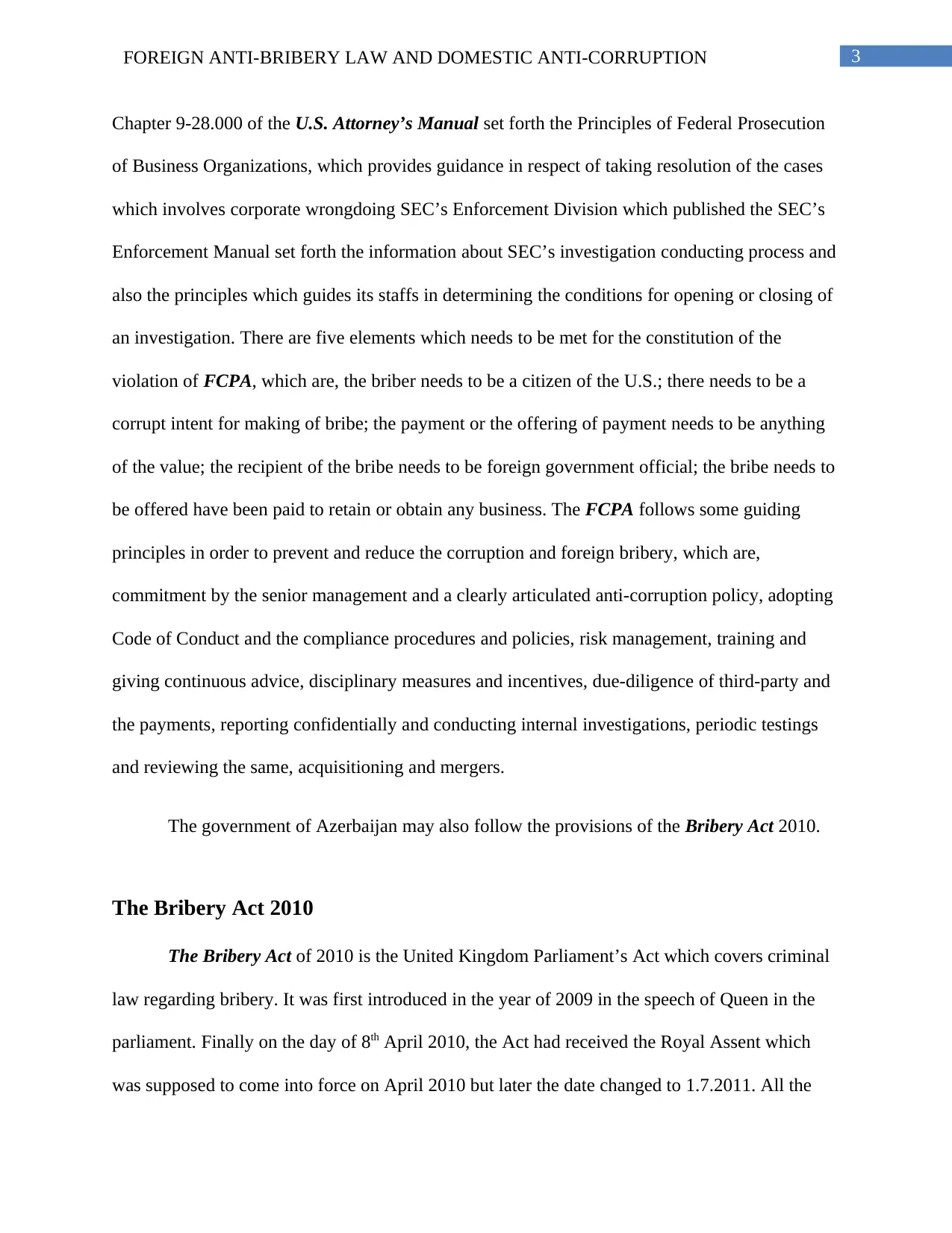
3FOREIGN ANTI-BRIBERY LAW AND DOMESTIC ANTI-CORRUPTION
Chapter 9-28.000 of the U.S. Attorney’s Manual set forth the Principles of Federal Prosecution
of Business Organizations, which provides guidance in respect of taking resolution of the cases
which involves corporate wrongdoing SEC’s Enforcement Division which published the SEC’s
Enforcement Manual set forth the information about SEC’s investigation conducting process and
also the principles which guides its staffs in determining the conditions for opening or closing of
an investigation. There are five elements which needs to be met for the constitution of the
violation of FCPA, which are, the briber needs to be a citizen of the U.S.; there needs to be a
corrupt intent for making of bribe; the payment or the offering of payment needs to be anything
of the value; the recipient of the bribe needs to be foreign government official; the bribe needs to
be offered have been paid to retain or obtain any business. The FCPA follows some guiding
principles in order to prevent and reduce the corruption and foreign bribery, which are,
commitment by the senior management and a clearly articulated anti-corruption policy, adopting
Code of Conduct and the compliance procedures and policies, risk management, training and
giving continuous advice, disciplinary measures and incentives, due-diligence of third-party and
the payments, reporting confidentially and conducting internal investigations, periodic testings
and reviewing the same, acquisitioning and mergers.
The government of Azerbaijan may also follow the provisions of the Bribery Act 2010.
The Bribery Act 2010
The Bribery Act of 2010 is the United Kingdom Parliament’s Act which covers criminal
law regarding bribery. It was first introduced in the year of 2009 in the speech of Queen in the
parliament. Finally on the day of 8th April 2010, the Act had received the Royal Assent which
was supposed to come into force on April 2010 but later the date changed to 1.7.2011. All the
Chapter 9-28.000 of the U.S. Attorney’s Manual set forth the Principles of Federal Prosecution
of Business Organizations, which provides guidance in respect of taking resolution of the cases
which involves corporate wrongdoing SEC’s Enforcement Division which published the SEC’s
Enforcement Manual set forth the information about SEC’s investigation conducting process and
also the principles which guides its staffs in determining the conditions for opening or closing of
an investigation. There are five elements which needs to be met for the constitution of the
violation of FCPA, which are, the briber needs to be a citizen of the U.S.; there needs to be a
corrupt intent for making of bribe; the payment or the offering of payment needs to be anything
of the value; the recipient of the bribe needs to be foreign government official; the bribe needs to
be offered have been paid to retain or obtain any business. The FCPA follows some guiding
principles in order to prevent and reduce the corruption and foreign bribery, which are,
commitment by the senior management and a clearly articulated anti-corruption policy, adopting
Code of Conduct and the compliance procedures and policies, risk management, training and
giving continuous advice, disciplinary measures and incentives, due-diligence of third-party and
the payments, reporting confidentially and conducting internal investigations, periodic testings
and reviewing the same, acquisitioning and mergers.
The government of Azerbaijan may also follow the provisions of the Bribery Act 2010.
The Bribery Act 2010
The Bribery Act of 2010 is the United Kingdom Parliament’s Act which covers criminal
law regarding bribery. It was first introduced in the year of 2009 in the speech of Queen in the
parliament. Finally on the day of 8th April 2010, the Act had received the Royal Assent which
was supposed to come into force on April 2010 but later the date changed to 1.7.2011. All the
Paraphrase This Document
Need a fresh take? Get an instant paraphrase of this document with our AI Paraphraser
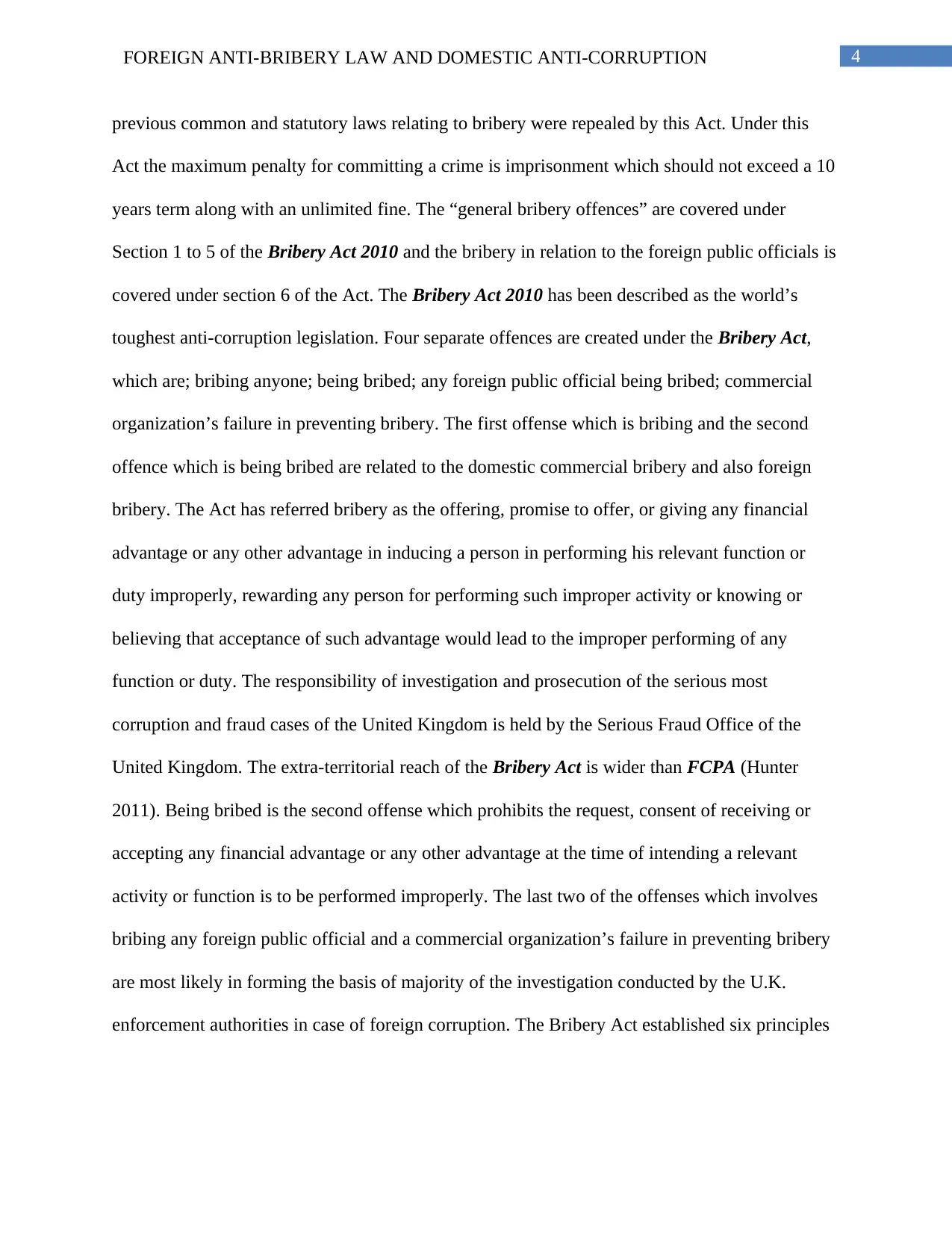
4FOREIGN ANTI-BRIBERY LAW AND DOMESTIC ANTI-CORRUPTION
previous common and statutory laws relating to bribery were repealed by this Act. Under this
Act the maximum penalty for committing a crime is imprisonment which should not exceed a 10
years term along with an unlimited fine. The “general bribery offences” are covered under
Section 1 to 5 of the Bribery Act 2010 and the bribery in relation to the foreign public officials is
covered under section 6 of the Act. The Bribery Act 2010 has been described as the world’s
toughest anti-corruption legislation. Four separate offences are created under the Bribery Act,
which are; bribing anyone; being bribed; any foreign public official being bribed; commercial
organization’s failure in preventing bribery. The first offense which is bribing and the second
offence which is being bribed are related to the domestic commercial bribery and also foreign
bribery. The Act has referred bribery as the offering, promise to offer, or giving any financial
advantage or any other advantage in inducing a person in performing his relevant function or
duty improperly, rewarding any person for performing such improper activity or knowing or
believing that acceptance of such advantage would lead to the improper performing of any
function or duty. The responsibility of investigation and prosecution of the serious most
corruption and fraud cases of the United Kingdom is held by the Serious Fraud Office of the
United Kingdom. The extra-territorial reach of the Bribery Act is wider than FCPA (Hunter
2011). Being bribed is the second offense which prohibits the request, consent of receiving or
accepting any financial advantage or any other advantage at the time of intending a relevant
activity or function is to be performed improperly. The last two of the offenses which involves
bribing any foreign public official and a commercial organization’s failure in preventing bribery
are most likely in forming the basis of majority of the investigation conducted by the U.K.
enforcement authorities in case of foreign corruption. The Bribery Act established six principles
previous common and statutory laws relating to bribery were repealed by this Act. Under this
Act the maximum penalty for committing a crime is imprisonment which should not exceed a 10
years term along with an unlimited fine. The “general bribery offences” are covered under
Section 1 to 5 of the Bribery Act 2010 and the bribery in relation to the foreign public officials is
covered under section 6 of the Act. The Bribery Act 2010 has been described as the world’s
toughest anti-corruption legislation. Four separate offences are created under the Bribery Act,
which are; bribing anyone; being bribed; any foreign public official being bribed; commercial
organization’s failure in preventing bribery. The first offense which is bribing and the second
offence which is being bribed are related to the domestic commercial bribery and also foreign
bribery. The Act has referred bribery as the offering, promise to offer, or giving any financial
advantage or any other advantage in inducing a person in performing his relevant function or
duty improperly, rewarding any person for performing such improper activity or knowing or
believing that acceptance of such advantage would lead to the improper performing of any
function or duty. The responsibility of investigation and prosecution of the serious most
corruption and fraud cases of the United Kingdom is held by the Serious Fraud Office of the
United Kingdom. The extra-territorial reach of the Bribery Act is wider than FCPA (Hunter
2011). Being bribed is the second offense which prohibits the request, consent of receiving or
accepting any financial advantage or any other advantage at the time of intending a relevant
activity or function is to be performed improperly. The last two of the offenses which involves
bribing any foreign public official and a commercial organization’s failure in preventing bribery
are most likely in forming the basis of majority of the investigation conducted by the U.K.
enforcement authorities in case of foreign corruption. The Bribery Act established six principles
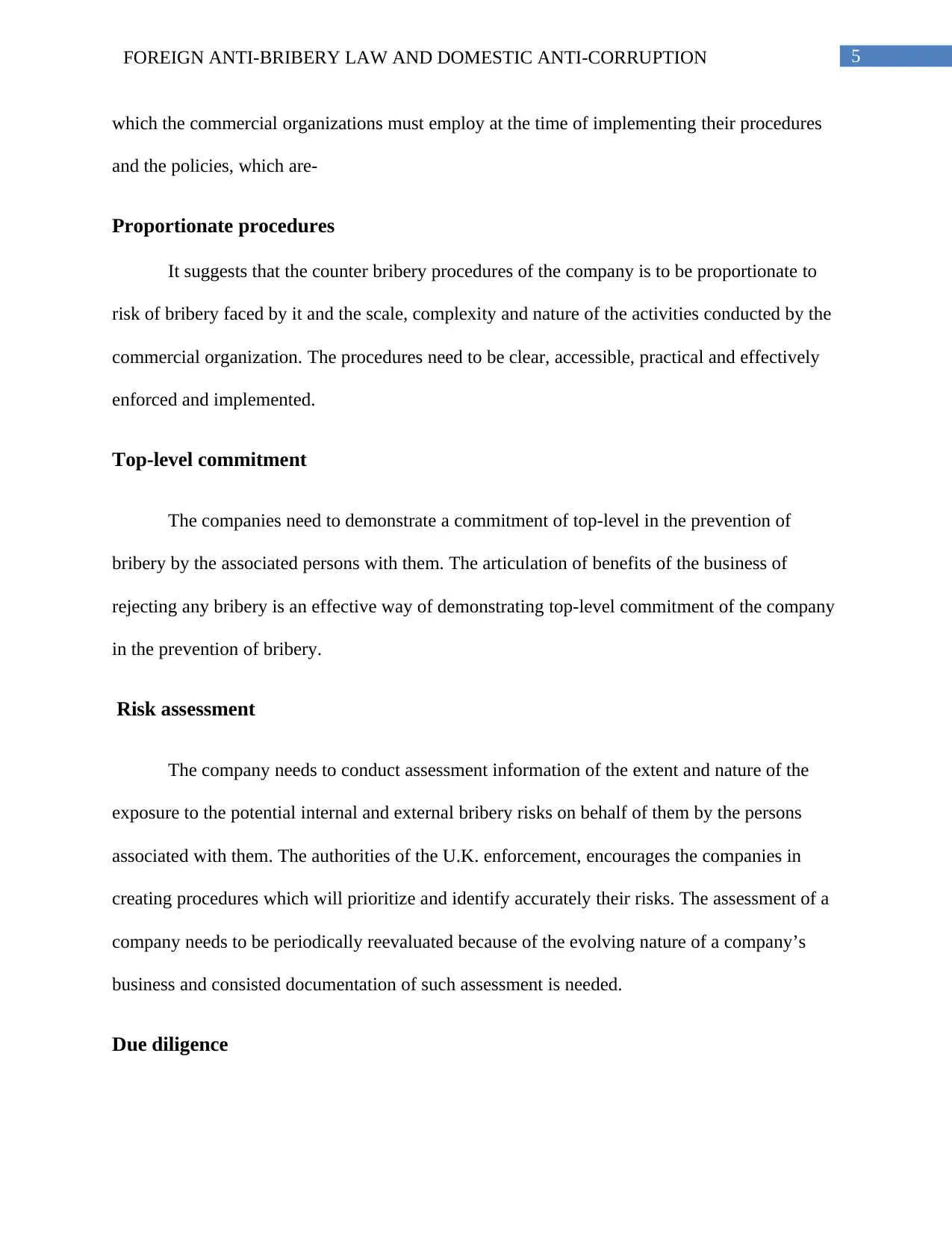
5FOREIGN ANTI-BRIBERY LAW AND DOMESTIC ANTI-CORRUPTION
which the commercial organizations must employ at the time of implementing their procedures
and the policies, which are-
Proportionate procedures
It suggests that the counter bribery procedures of the company is to be proportionate to
risk of bribery faced by it and the scale, complexity and nature of the activities conducted by the
commercial organization. The procedures need to be clear, accessible, practical and effectively
enforced and implemented.
Top-level commitment
The companies need to demonstrate a commitment of top-level in the prevention of
bribery by the associated persons with them. The articulation of benefits of the business of
rejecting any bribery is an effective way of demonstrating top-level commitment of the company
in the prevention of bribery.
Risk assessment
The company needs to conduct assessment information of the extent and nature of the
exposure to the potential internal and external bribery risks on behalf of them by the persons
associated with them. The authorities of the U.K. enforcement, encourages the companies in
creating procedures which will prioritize and identify accurately their risks. The assessment of a
company needs to be periodically reevaluated because of the evolving nature of a company’s
business and consisted documentation of such assessment is needed.
Due diligence
which the commercial organizations must employ at the time of implementing their procedures
and the policies, which are-
Proportionate procedures
It suggests that the counter bribery procedures of the company is to be proportionate to
risk of bribery faced by it and the scale, complexity and nature of the activities conducted by the
commercial organization. The procedures need to be clear, accessible, practical and effectively
enforced and implemented.
Top-level commitment
The companies need to demonstrate a commitment of top-level in the prevention of
bribery by the associated persons with them. The articulation of benefits of the business of
rejecting any bribery is an effective way of demonstrating top-level commitment of the company
in the prevention of bribery.
Risk assessment
The company needs to conduct assessment information of the extent and nature of the
exposure to the potential internal and external bribery risks on behalf of them by the persons
associated with them. The authorities of the U.K. enforcement, encourages the companies in
creating procedures which will prioritize and identify accurately their risks. The assessment of a
company needs to be periodically reevaluated because of the evolving nature of a company’s
business and consisted documentation of such assessment is needed.
Due diligence
⊘ This is a preview!⊘
Do you want full access?
Subscribe today to unlock all pages.

Trusted by 1+ million students worldwide
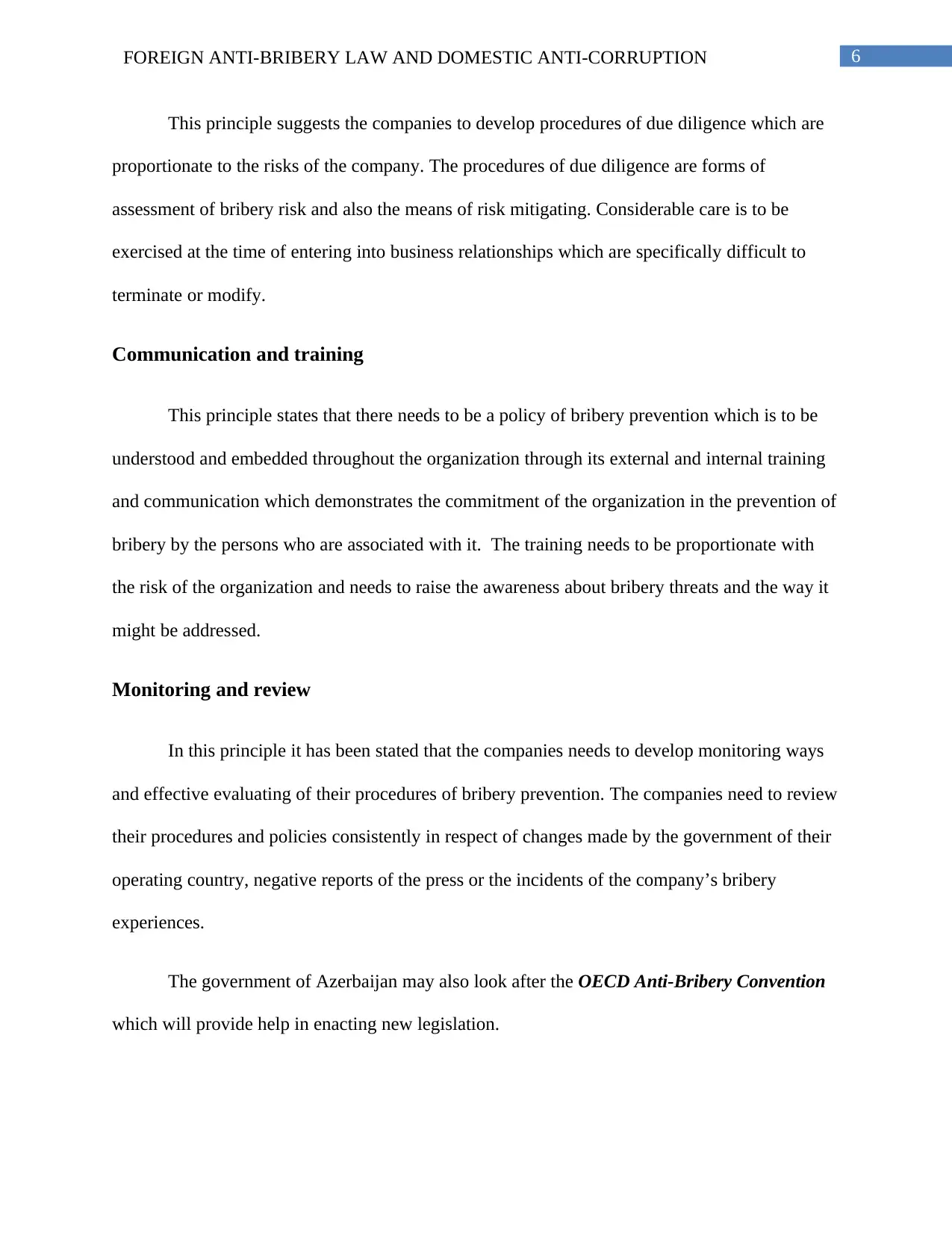
6FOREIGN ANTI-BRIBERY LAW AND DOMESTIC ANTI-CORRUPTION
This principle suggests the companies to develop procedures of due diligence which are
proportionate to the risks of the company. The procedures of due diligence are forms of
assessment of bribery risk and also the means of risk mitigating. Considerable care is to be
exercised at the time of entering into business relationships which are specifically difficult to
terminate or modify.
Communication and training
This principle states that there needs to be a policy of bribery prevention which is to be
understood and embedded throughout the organization through its external and internal training
and communication which demonstrates the commitment of the organization in the prevention of
bribery by the persons who are associated with it. The training needs to be proportionate with
the risk of the organization and needs to raise the awareness about bribery threats and the way it
might be addressed.
Monitoring and review
In this principle it has been stated that the companies needs to develop monitoring ways
and effective evaluating of their procedures of bribery prevention. The companies need to review
their procedures and policies consistently in respect of changes made by the government of their
operating country, negative reports of the press or the incidents of the company’s bribery
experiences.
The government of Azerbaijan may also look after the OECD Anti-Bribery Convention
which will provide help in enacting new legislation.
This principle suggests the companies to develop procedures of due diligence which are
proportionate to the risks of the company. The procedures of due diligence are forms of
assessment of bribery risk and also the means of risk mitigating. Considerable care is to be
exercised at the time of entering into business relationships which are specifically difficult to
terminate or modify.
Communication and training
This principle states that there needs to be a policy of bribery prevention which is to be
understood and embedded throughout the organization through its external and internal training
and communication which demonstrates the commitment of the organization in the prevention of
bribery by the persons who are associated with it. The training needs to be proportionate with
the risk of the organization and needs to raise the awareness about bribery threats and the way it
might be addressed.
Monitoring and review
In this principle it has been stated that the companies needs to develop monitoring ways
and effective evaluating of their procedures of bribery prevention. The companies need to review
their procedures and policies consistently in respect of changes made by the government of their
operating country, negative reports of the press or the incidents of the company’s bribery
experiences.
The government of Azerbaijan may also look after the OECD Anti-Bribery Convention
which will provide help in enacting new legislation.
Paraphrase This Document
Need a fresh take? Get an instant paraphrase of this document with our AI Paraphraser
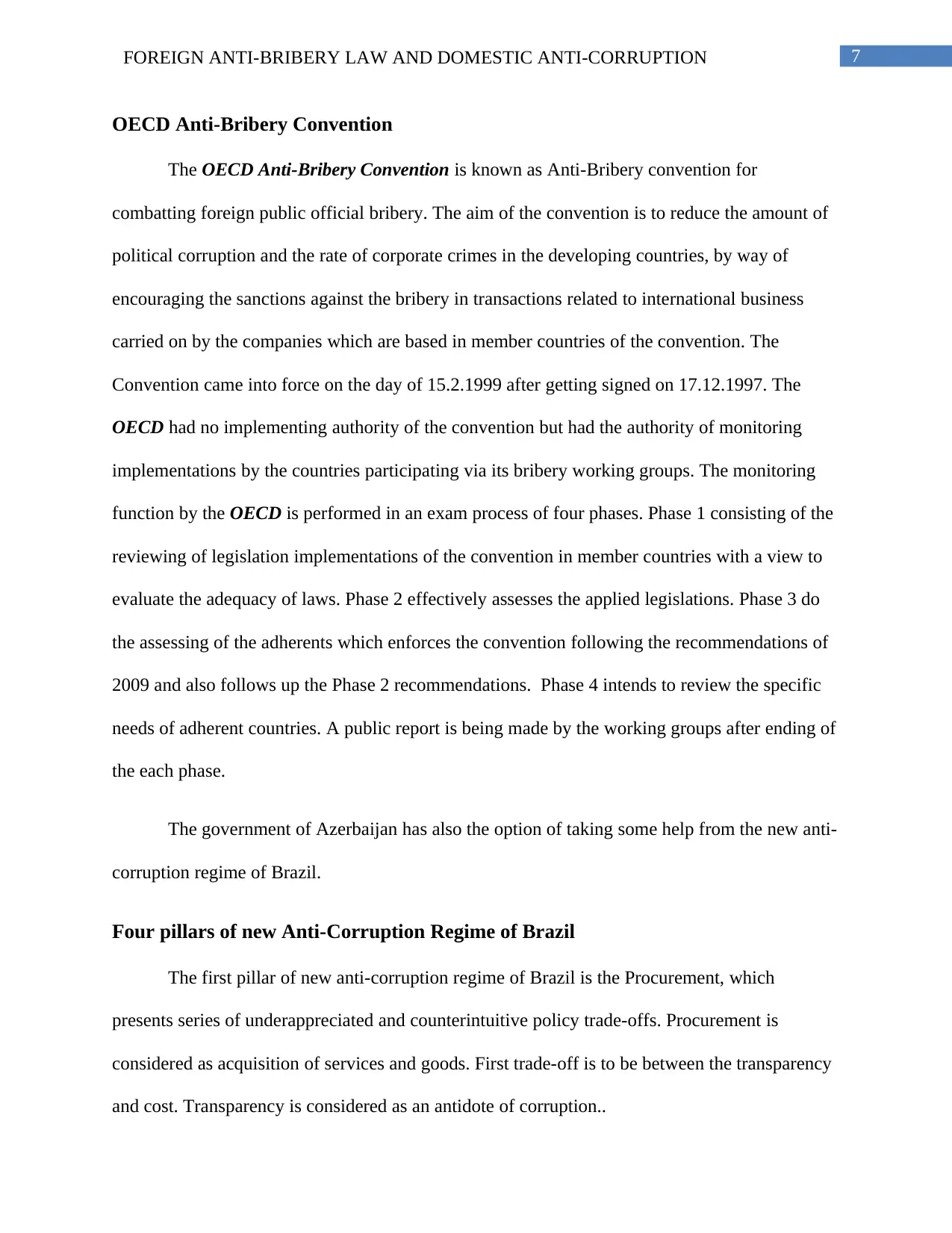
7FOREIGN ANTI-BRIBERY LAW AND DOMESTIC ANTI-CORRUPTION
OECD Anti-Bribery Convention
The OECD Anti-Bribery Convention is known as Anti-Bribery convention for
combatting foreign public official bribery. The aim of the convention is to reduce the amount of
political corruption and the rate of corporate crimes in the developing countries, by way of
encouraging the sanctions against the bribery in transactions related to international business
carried on by the companies which are based in member countries of the convention. The
Convention came into force on the day of 15.2.1999 after getting signed on 17.12.1997. The
OECD had no implementing authority of the convention but had the authority of monitoring
implementations by the countries participating via its bribery working groups. The monitoring
function by the OECD is performed in an exam process of four phases. Phase 1 consisting of the
reviewing of legislation implementations of the convention in member countries with a view to
evaluate the adequacy of laws. Phase 2 effectively assesses the applied legislations. Phase 3 do
the assessing of the adherents which enforces the convention following the recommendations of
2009 and also follows up the Phase 2 recommendations. Phase 4 intends to review the specific
needs of adherent countries. A public report is being made by the working groups after ending of
the each phase.
The government of Azerbaijan has also the option of taking some help from the new anti-
corruption regime of Brazil.
Four pillars of new Anti-Corruption Regime of Brazil
The first pillar of new anti-corruption regime of Brazil is the Procurement, which
presents series of underappreciated and counterintuitive policy trade-offs. Procurement is
considered as acquisition of services and goods. First trade-off is to be between the transparency
and cost. Transparency is considered as an antidote of corruption..
OECD Anti-Bribery Convention
The OECD Anti-Bribery Convention is known as Anti-Bribery convention for
combatting foreign public official bribery. The aim of the convention is to reduce the amount of
political corruption and the rate of corporate crimes in the developing countries, by way of
encouraging the sanctions against the bribery in transactions related to international business
carried on by the companies which are based in member countries of the convention. The
Convention came into force on the day of 15.2.1999 after getting signed on 17.12.1997. The
OECD had no implementing authority of the convention but had the authority of monitoring
implementations by the countries participating via its bribery working groups. The monitoring
function by the OECD is performed in an exam process of four phases. Phase 1 consisting of the
reviewing of legislation implementations of the convention in member countries with a view to
evaluate the adequacy of laws. Phase 2 effectively assesses the applied legislations. Phase 3 do
the assessing of the adherents which enforces the convention following the recommendations of
2009 and also follows up the Phase 2 recommendations. Phase 4 intends to review the specific
needs of adherent countries. A public report is being made by the working groups after ending of
the each phase.
The government of Azerbaijan has also the option of taking some help from the new anti-
corruption regime of Brazil.
Four pillars of new Anti-Corruption Regime of Brazil
The first pillar of new anti-corruption regime of Brazil is the Procurement, which
presents series of underappreciated and counterintuitive policy trade-offs. Procurement is
considered as acquisition of services and goods. First trade-off is to be between the transparency
and cost. Transparency is considered as an antidote of corruption..
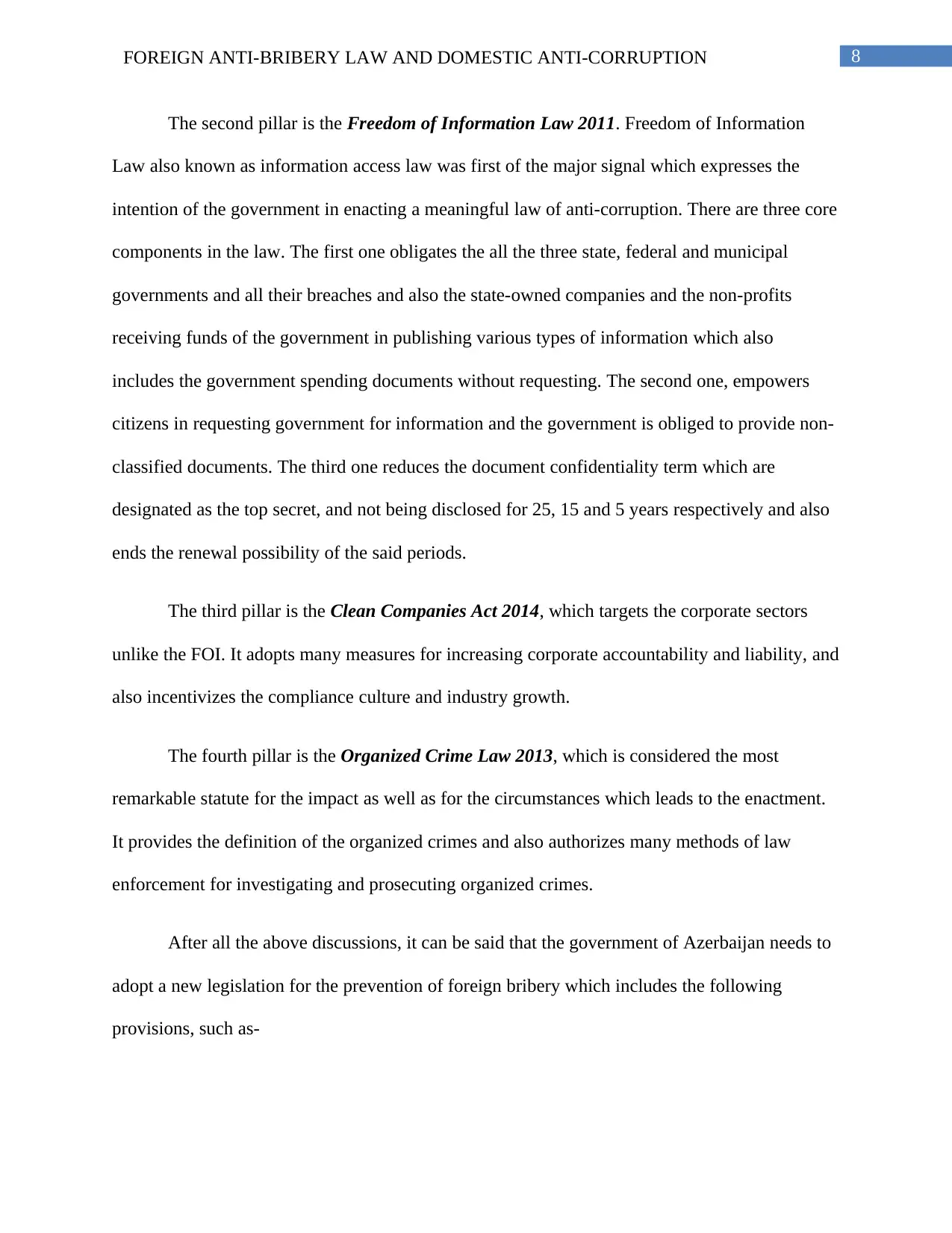
8FOREIGN ANTI-BRIBERY LAW AND DOMESTIC ANTI-CORRUPTION
The second pillar is the Freedom of Information Law 2011. Freedom of Information
Law also known as information access law was first of the major signal which expresses the
intention of the government in enacting a meaningful law of anti-corruption. There are three core
components in the law. The first one obligates the all the three state, federal and municipal
governments and all their breaches and also the state-owned companies and the non-profits
receiving funds of the government in publishing various types of information which also
includes the government spending documents without requesting. The second one, empowers
citizens in requesting government for information and the government is obliged to provide non-
classified documents. The third one reduces the document confidentiality term which are
designated as the top secret, and not being disclosed for 25, 15 and 5 years respectively and also
ends the renewal possibility of the said periods.
The third pillar is the Clean Companies Act 2014, which targets the corporate sectors
unlike the FOI. It adopts many measures for increasing corporate accountability and liability, and
also incentivizes the compliance culture and industry growth.
The fourth pillar is the Organized Crime Law 2013, which is considered the most
remarkable statute for the impact as well as for the circumstances which leads to the enactment.
It provides the definition of the organized crimes and also authorizes many methods of law
enforcement for investigating and prosecuting organized crimes.
After all the above discussions, it can be said that the government of Azerbaijan needs to
adopt a new legislation for the prevention of foreign bribery which includes the following
provisions, such as-
The second pillar is the Freedom of Information Law 2011. Freedom of Information
Law also known as information access law was first of the major signal which expresses the
intention of the government in enacting a meaningful law of anti-corruption. There are three core
components in the law. The first one obligates the all the three state, federal and municipal
governments and all their breaches and also the state-owned companies and the non-profits
receiving funds of the government in publishing various types of information which also
includes the government spending documents without requesting. The second one, empowers
citizens in requesting government for information and the government is obliged to provide non-
classified documents. The third one reduces the document confidentiality term which are
designated as the top secret, and not being disclosed for 25, 15 and 5 years respectively and also
ends the renewal possibility of the said periods.
The third pillar is the Clean Companies Act 2014, which targets the corporate sectors
unlike the FOI. It adopts many measures for increasing corporate accountability and liability, and
also incentivizes the compliance culture and industry growth.
The fourth pillar is the Organized Crime Law 2013, which is considered the most
remarkable statute for the impact as well as for the circumstances which leads to the enactment.
It provides the definition of the organized crimes and also authorizes many methods of law
enforcement for investigating and prosecuting organized crimes.
After all the above discussions, it can be said that the government of Azerbaijan needs to
adopt a new legislation for the prevention of foreign bribery which includes the following
provisions, such as-
⊘ This is a preview!⊘
Do you want full access?
Subscribe today to unlock all pages.

Trusted by 1+ million students worldwide
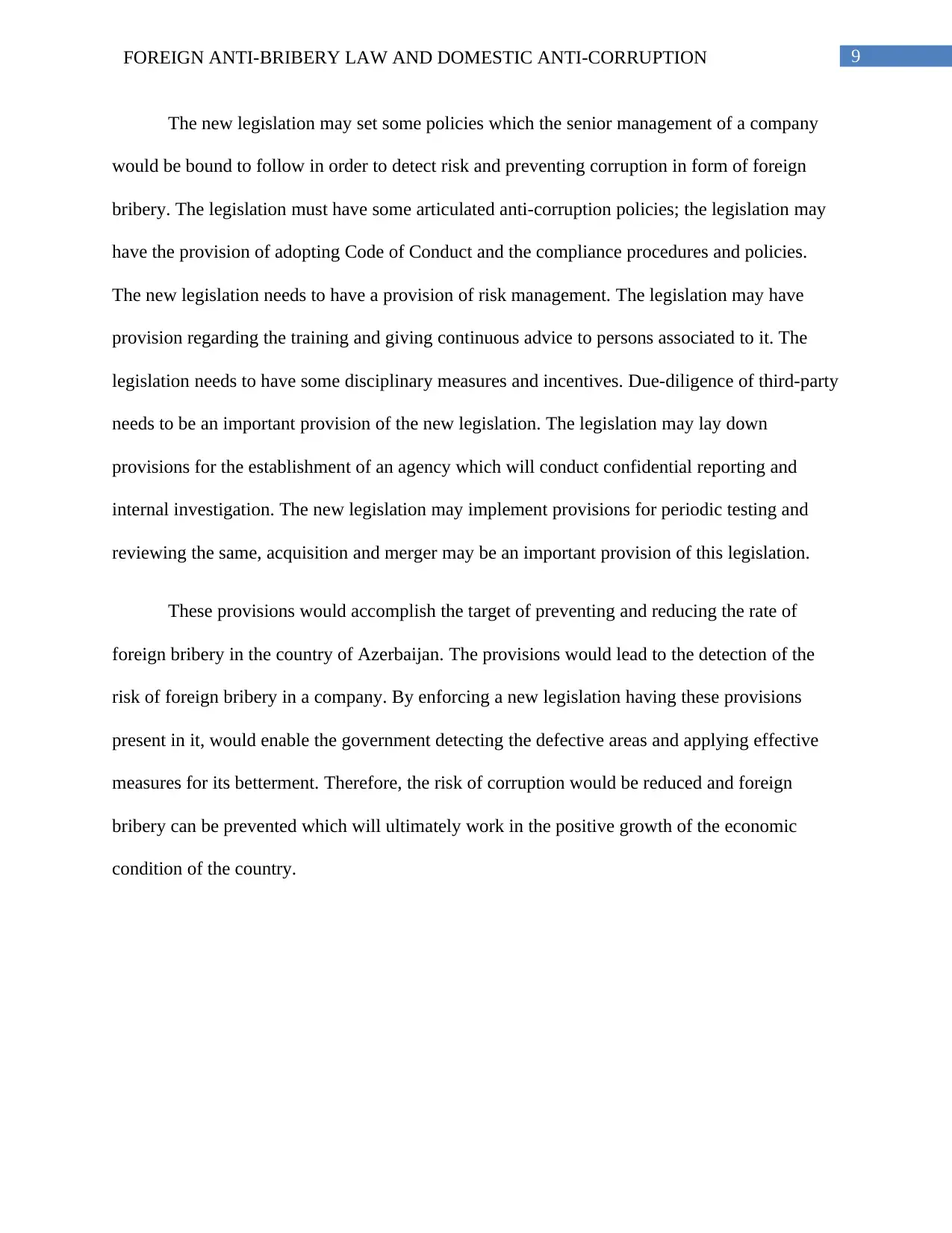
9FOREIGN ANTI-BRIBERY LAW AND DOMESTIC ANTI-CORRUPTION
The new legislation may set some policies which the senior management of a company
would be bound to follow in order to detect risk and preventing corruption in form of foreign
bribery. The legislation must have some articulated anti-corruption policies; the legislation may
have the provision of adopting Code of Conduct and the compliance procedures and policies.
The new legislation needs to have a provision of risk management. The legislation may have
provision regarding the training and giving continuous advice to persons associated to it. The
legislation needs to have some disciplinary measures and incentives. Due-diligence of third-party
needs to be an important provision of the new legislation. The legislation may lay down
provisions for the establishment of an agency which will conduct confidential reporting and
internal investigation. The new legislation may implement provisions for periodic testing and
reviewing the same, acquisition and merger may be an important provision of this legislation.
These provisions would accomplish the target of preventing and reducing the rate of
foreign bribery in the country of Azerbaijan. The provisions would lead to the detection of the
risk of foreign bribery in a company. By enforcing a new legislation having these provisions
present in it, would enable the government detecting the defective areas and applying effective
measures for its betterment. Therefore, the risk of corruption would be reduced and foreign
bribery can be prevented which will ultimately work in the positive growth of the economic
condition of the country.
The new legislation may set some policies which the senior management of a company
would be bound to follow in order to detect risk and preventing corruption in form of foreign
bribery. The legislation must have some articulated anti-corruption policies; the legislation may
have the provision of adopting Code of Conduct and the compliance procedures and policies.
The new legislation needs to have a provision of risk management. The legislation may have
provision regarding the training and giving continuous advice to persons associated to it. The
legislation needs to have some disciplinary measures and incentives. Due-diligence of third-party
needs to be an important provision of the new legislation. The legislation may lay down
provisions for the establishment of an agency which will conduct confidential reporting and
internal investigation. The new legislation may implement provisions for periodic testing and
reviewing the same, acquisition and merger may be an important provision of this legislation.
These provisions would accomplish the target of preventing and reducing the rate of
foreign bribery in the country of Azerbaijan. The provisions would lead to the detection of the
risk of foreign bribery in a company. By enforcing a new legislation having these provisions
present in it, would enable the government detecting the defective areas and applying effective
measures for its betterment. Therefore, the risk of corruption would be reduced and foreign
bribery can be prevented which will ultimately work in the positive growth of the economic
condition of the country.
Paraphrase This Document
Need a fresh take? Get an instant paraphrase of this document with our AI Paraphraser
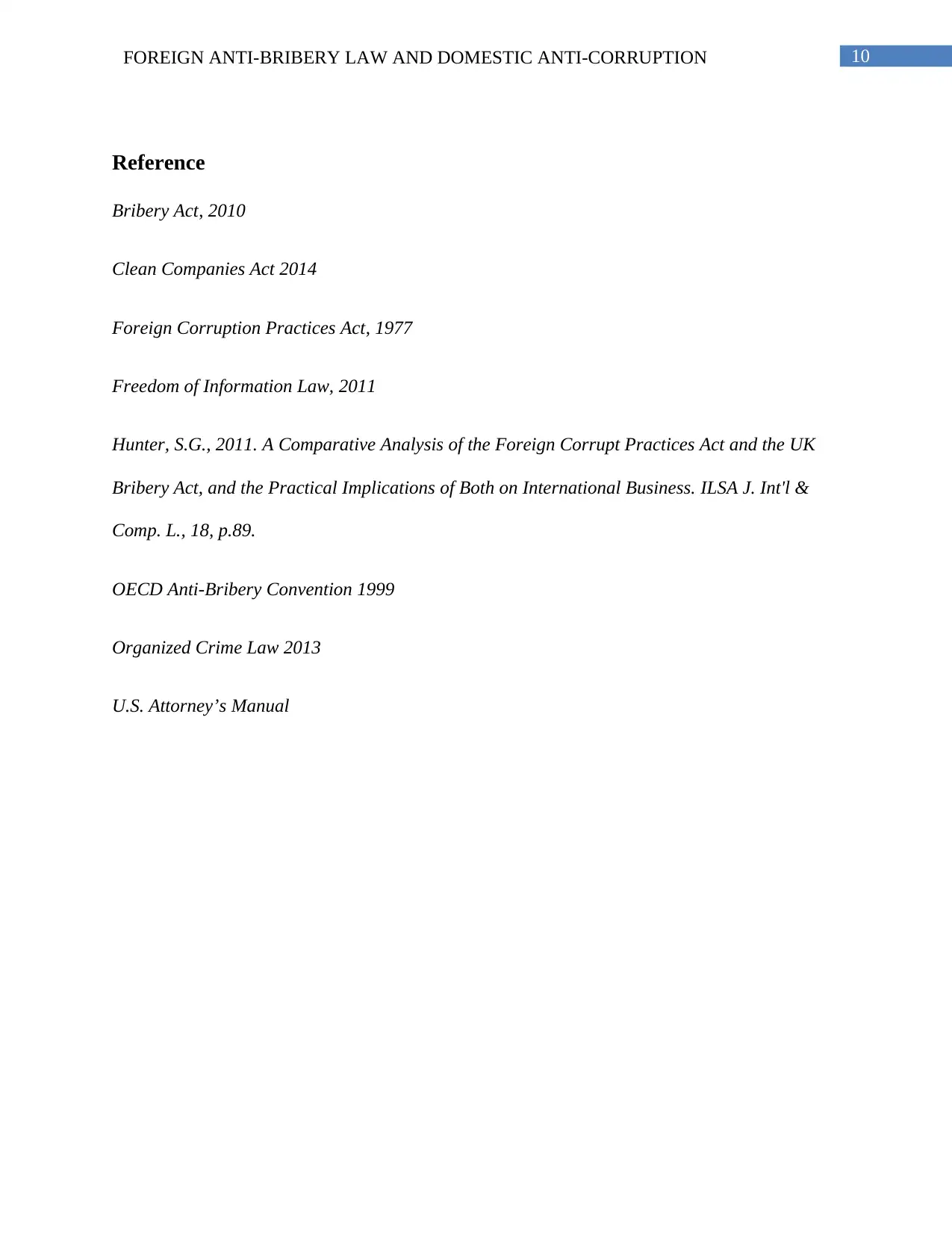
10FOREIGN ANTI-BRIBERY LAW AND DOMESTIC ANTI-CORRUPTION
Reference
Bribery Act, 2010
Clean Companies Act 2014
Foreign Corruption Practices Act, 1977
Freedom of Information Law, 2011
Hunter, S.G., 2011. A Comparative Analysis of the Foreign Corrupt Practices Act and the UK
Bribery Act, and the Practical Implications of Both on International Business. ILSA J. Int'l &
Comp. L., 18, p.89.
OECD Anti-Bribery Convention 1999
Organized Crime Law 2013
U.S. Attorney’s Manual
Reference
Bribery Act, 2010
Clean Companies Act 2014
Foreign Corruption Practices Act, 1977
Freedom of Information Law, 2011
Hunter, S.G., 2011. A Comparative Analysis of the Foreign Corrupt Practices Act and the UK
Bribery Act, and the Practical Implications of Both on International Business. ILSA J. Int'l &
Comp. L., 18, p.89.
OECD Anti-Bribery Convention 1999
Organized Crime Law 2013
U.S. Attorney’s Manual
1 out of 11
Related Documents
Your All-in-One AI-Powered Toolkit for Academic Success.
+13062052269
info@desklib.com
Available 24*7 on WhatsApp / Email
![[object Object]](/_next/static/media/star-bottom.7253800d.svg)
Unlock your academic potential
Copyright © 2020–2026 A2Z Services. All Rights Reserved. Developed and managed by ZUCOL.





